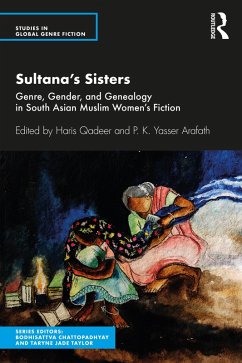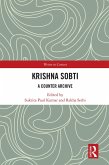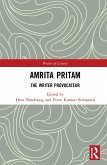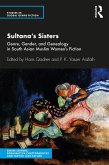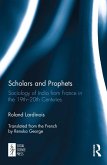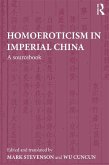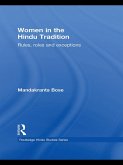Sultana's Sisters (eBook, ePUB)
Genre, Gender, and Genealogy in South Asian Muslim Women's Fiction
Redaktion: Qadeer, Haris; Arafath, P. K. Yasser
42,95 €
42,95 €
inkl. MwSt.
Sofort per Download lieferbar

21 °P sammeln
42,95 €
Als Download kaufen

42,95 €
inkl. MwSt.
Sofort per Download lieferbar

21 °P sammeln
Jetzt verschenken
Alle Infos zum eBook verschenken
42,95 €
inkl. MwSt.
Sofort per Download lieferbar
Alle Infos zum eBook verschenken

21 °P sammeln
Sultana's Sisters (eBook, ePUB)
Genre, Gender, and Genealogy in South Asian Muslim Women's Fiction
Redaktion: Qadeer, Haris; Arafath, P. K. Yasser
- Format: ePub
- Merkliste
- Auf die Merkliste
- Bewerten Bewerten
- Teilen
- Produkt teilen
- Produkterinnerung
- Produkterinnerung

Bitte loggen Sie sich zunächst in Ihr Kundenkonto ein oder registrieren Sie sich bei
bücher.de, um das eBook-Abo tolino select nutzen zu können.
Hier können Sie sich einloggen
Hier können Sie sich einloggen
Sie sind bereits eingeloggt. Klicken Sie auf 2. tolino select Abo, um fortzufahren.

Bitte loggen Sie sich zunächst in Ihr Kundenkonto ein oder registrieren Sie sich bei bücher.de, um das eBook-Abo tolino select nutzen zu können.
This book traces the genealogy of 'women's fiction' in South Asia and looks at the interesting and fascinating world of fiction by Muslim women. It explores how Muslim women have contributed to the growth and development of genre fiction in South Asia, and brings into focus various diverse genres.
- Geräte: eReader
- mit Kopierschutz
- eBook Hilfe
Andere Kunden interessierten sich auch für
![Krishna Sobti (eBook, ePUB) Krishna Sobti (eBook, ePUB)]() Krishna Sobti (eBook, ePUB)40,95 €
Krishna Sobti (eBook, ePUB)40,95 €![Amrita Pritam (eBook, ePUB) Amrita Pritam (eBook, ePUB)]() Amrita Pritam (eBook, ePUB)39,95 €
Amrita Pritam (eBook, ePUB)39,95 €![Sultana's Sisters (eBook, PDF) Sultana's Sisters (eBook, PDF)]() Sultana's Sisters (eBook, PDF)43,95 €
Sultana's Sisters (eBook, PDF)43,95 €![Scholars and Prophets (eBook, ePUB) Scholars and Prophets (eBook, ePUB)]() Roland LardinoisScholars and Prophets (eBook, ePUB)42,95 €
Roland LardinoisScholars and Prophets (eBook, ePUB)42,95 €![Homoeroticism in Imperial China (eBook, ePUB) Homoeroticism in Imperial China (eBook, ePUB)]() Homoeroticism in Imperial China (eBook, ePUB)42,95 €
Homoeroticism in Imperial China (eBook, ePUB)42,95 €![Bama (eBook, ePUB) Bama (eBook, ePUB)]() Bama (eBook, ePUB)40,95 €
Bama (eBook, ePUB)40,95 €![Women in the Hindu Tradition (eBook, ePUB) Women in the Hindu Tradition (eBook, ePUB)]() Mandakranta BoseWomen in the Hindu Tradition (eBook, ePUB)57,95 €
Mandakranta BoseWomen in the Hindu Tradition (eBook, ePUB)57,95 €-
-
-
This book traces the genealogy of 'women's fiction' in South Asia and looks at the interesting and fascinating world of fiction by Muslim women. It explores how Muslim women have contributed to the growth and development of genre fiction in South Asia, and brings into focus various diverse genres.
Dieser Download kann aus rechtlichen Gründen nur mit Rechnungsadresse in A, B, BG, CY, CZ, D, DK, EW, E, FIN, F, GR, HR, H, IRL, I, LT, L, LR, M, NL, PL, P, R, S, SLO, SK ausgeliefert werden.
Produktdetails
- Produktdetails
- Verlag: Taylor & Francis eBooks
- Seitenzahl: 274
- Erscheinungstermin: 27. September 2021
- Englisch
- ISBN-13: 9781000458015
- Artikelnr.: 62558916
- Verlag: Taylor & Francis eBooks
- Seitenzahl: 274
- Erscheinungstermin: 27. September 2021
- Englisch
- ISBN-13: 9781000458015
- Artikelnr.: 62558916
- Herstellerkennzeichnung Die Herstellerinformationen sind derzeit nicht verfügbar.
Haris Qadeer is Assistant Professor at the Department of English, University of Delhi, India. He was visiting faculty at the Department of English, Potsdam University, Germany (2019). His research interests include literatures and cultures of South Asian Muslims, refugee narratives, post-colonial studies, translations, and South Asian writings in English. He has coedited a special issue on postcolonial world literature, Thesis Eleven. He has translated writings by Joginder Paul, Rokeya Sakhawat Hossain, Manto, Zafar Ali, Anis Rafi, Krishn Chandra, and Taranum Riyaz. His forthcoming works are The Silence that Speaks: Short Fiction by Indian Muslim Women and Medical Maladies: Doctors, Patients, and Hospitals in Indian Short Fiction. P. K. Yasser Arafath is Assistant Professor at the Department of History, University of Delhi, India. He was Dr. L. M. Singhvi Fellow at the Centre of South Asian Studies, Cambridge University, UK (2017). His research papers and articles have been published in major journals, including Economic and Political Weekly, Social Scientists, Medieval History Journal , IESHR, and Journal of the Royal Asiatic Society. Currently, he is completing a book manuscript, titled Malabarnama: Intimate Texts and Lyrical Resistance in the Age of Disorder (c. 1500-1875). He has a PhD degree in History from Hyderabad Central University (HCU), India.
Introduction
Section I
Genres and Early Fiction
1. Fruits of Freedom: Rokeya Sakhawat Hossain's Writings as Genre
Fiction
Barnita Bagchi
2. Locating Romance and Women Writers in Urdu Literature: Hijab Imtiaz
Ali's Genre
Fiction
Shweta Sachdeva Jha
3. "I'm nobody! Who are you?" Mrs. Abdul Q¿dir's Horror Fiction and the
Non-
Authorial
Jaideep Pandey
4. Gendering the Urdu Novel: Muhammadi Begum, Abbasi Begum, and the Women
Question
Mohammed Afzal
Section II
Genres and Modernity
5. Women Who Wielded Pens: Khadija Mastur
Mehr Afshan Farooqi
6. "Studies in [ ] Dying Culture[s]": Qurratulain Hyder and Urdu Fantasy
Fiction in Self-translation
Fatima Rizvi
7. "The Forbidden City": An Exploration of Wajida Tabassum's Fiction
Wafa Hamid
8. '1971 Novels' in Bangladesh: Women's Writing between the Popular and the
Literary
Mosarrap Hossain Khan
9. Sunlight on a Broken Column and The Heart Divided as
Autobiographically-Inspired
Realist Texts: Navigating Gendered Socio-political Identities in Genre
Fiction
Mobeen Hussain
Section III
Postcolonial Genres
10. "Obedient daughters" and the Deployment of Graphic Stereotypes
Christel Devadawson
11 Contemporary Politics and Prehistoric Past through Popular Genres: Maha
Khan
Phillips' Novels
Mohammad Asim Siddiqui
12. Occupying Educational and Intellectual Space: Woman as Radical Flâneuse
in Zahida Zaidi's Campus Novel Inqilab Ka Ek Din
Aysha Munira Rasheed
13. Making Sense of Conversion to Christianity in Twentieth-Century
Pakistan: Two
Women's Co-Authored Autobiographies as Crafted Accounts
Madeline Clements
14. Feminist Futures in the Speculative Fictions of Andaleeb Wajid and Bina
Shah
Umme Al-wazedi
Section I
Genres and Early Fiction
1. Fruits of Freedom: Rokeya Sakhawat Hossain's Writings as Genre
Fiction
Barnita Bagchi
2. Locating Romance and Women Writers in Urdu Literature: Hijab Imtiaz
Ali's Genre
Fiction
Shweta Sachdeva Jha
3. "I'm nobody! Who are you?" Mrs. Abdul Q¿dir's Horror Fiction and the
Non-
Authorial
Jaideep Pandey
4. Gendering the Urdu Novel: Muhammadi Begum, Abbasi Begum, and the Women
Question
Mohammed Afzal
Section II
Genres and Modernity
5. Women Who Wielded Pens: Khadija Mastur
Mehr Afshan Farooqi
6. "Studies in [ ] Dying Culture[s]": Qurratulain Hyder and Urdu Fantasy
Fiction in Self-translation
Fatima Rizvi
7. "The Forbidden City": An Exploration of Wajida Tabassum's Fiction
Wafa Hamid
8. '1971 Novels' in Bangladesh: Women's Writing between the Popular and the
Literary
Mosarrap Hossain Khan
9. Sunlight on a Broken Column and The Heart Divided as
Autobiographically-Inspired
Realist Texts: Navigating Gendered Socio-political Identities in Genre
Fiction
Mobeen Hussain
Section III
Postcolonial Genres
10. "Obedient daughters" and the Deployment of Graphic Stereotypes
Christel Devadawson
11 Contemporary Politics and Prehistoric Past through Popular Genres: Maha
Khan
Phillips' Novels
Mohammad Asim Siddiqui
12. Occupying Educational and Intellectual Space: Woman as Radical Flâneuse
in Zahida Zaidi's Campus Novel Inqilab Ka Ek Din
Aysha Munira Rasheed
13. Making Sense of Conversion to Christianity in Twentieth-Century
Pakistan: Two
Women's Co-Authored Autobiographies as Crafted Accounts
Madeline Clements
14. Feminist Futures in the Speculative Fictions of Andaleeb Wajid and Bina
Shah
Umme Al-wazedi
Introduction
Section I
Genres and Early Fiction
1. Fruits of Freedom: Rokeya Sakhawat Hossain's Writings as Genre
Fiction
Barnita Bagchi
2. Locating Romance and Women Writers in Urdu Literature: Hijab Imtiaz
Ali's Genre
Fiction
Shweta Sachdeva Jha
3. "I'm nobody! Who are you?" Mrs. Abdul Q¿dir's Horror Fiction and the
Non-
Authorial
Jaideep Pandey
4. Gendering the Urdu Novel: Muhammadi Begum, Abbasi Begum, and the Women
Question
Mohammed Afzal
Section II
Genres and Modernity
5. Women Who Wielded Pens: Khadija Mastur
Mehr Afshan Farooqi
6. "Studies in [ ] Dying Culture[s]": Qurratulain Hyder and Urdu Fantasy
Fiction in Self-translation
Fatima Rizvi
7. "The Forbidden City": An Exploration of Wajida Tabassum's Fiction
Wafa Hamid
8. '1971 Novels' in Bangladesh: Women's Writing between the Popular and the
Literary
Mosarrap Hossain Khan
9. Sunlight on a Broken Column and The Heart Divided as
Autobiographically-Inspired
Realist Texts: Navigating Gendered Socio-political Identities in Genre
Fiction
Mobeen Hussain
Section III
Postcolonial Genres
10. "Obedient daughters" and the Deployment of Graphic Stereotypes
Christel Devadawson
11 Contemporary Politics and Prehistoric Past through Popular Genres: Maha
Khan
Phillips' Novels
Mohammad Asim Siddiqui
12. Occupying Educational and Intellectual Space: Woman as Radical Flâneuse
in Zahida Zaidi's Campus Novel Inqilab Ka Ek Din
Aysha Munira Rasheed
13. Making Sense of Conversion to Christianity in Twentieth-Century
Pakistan: Two
Women's Co-Authored Autobiographies as Crafted Accounts
Madeline Clements
14. Feminist Futures in the Speculative Fictions of Andaleeb Wajid and Bina
Shah
Umme Al-wazedi
Section I
Genres and Early Fiction
1. Fruits of Freedom: Rokeya Sakhawat Hossain's Writings as Genre
Fiction
Barnita Bagchi
2. Locating Romance and Women Writers in Urdu Literature: Hijab Imtiaz
Ali's Genre
Fiction
Shweta Sachdeva Jha
3. "I'm nobody! Who are you?" Mrs. Abdul Q¿dir's Horror Fiction and the
Non-
Authorial
Jaideep Pandey
4. Gendering the Urdu Novel: Muhammadi Begum, Abbasi Begum, and the Women
Question
Mohammed Afzal
Section II
Genres and Modernity
5. Women Who Wielded Pens: Khadija Mastur
Mehr Afshan Farooqi
6. "Studies in [ ] Dying Culture[s]": Qurratulain Hyder and Urdu Fantasy
Fiction in Self-translation
Fatima Rizvi
7. "The Forbidden City": An Exploration of Wajida Tabassum's Fiction
Wafa Hamid
8. '1971 Novels' in Bangladesh: Women's Writing between the Popular and the
Literary
Mosarrap Hossain Khan
9. Sunlight on a Broken Column and The Heart Divided as
Autobiographically-Inspired
Realist Texts: Navigating Gendered Socio-political Identities in Genre
Fiction
Mobeen Hussain
Section III
Postcolonial Genres
10. "Obedient daughters" and the Deployment of Graphic Stereotypes
Christel Devadawson
11 Contemporary Politics and Prehistoric Past through Popular Genres: Maha
Khan
Phillips' Novels
Mohammad Asim Siddiqui
12. Occupying Educational and Intellectual Space: Woman as Radical Flâneuse
in Zahida Zaidi's Campus Novel Inqilab Ka Ek Din
Aysha Munira Rasheed
13. Making Sense of Conversion to Christianity in Twentieth-Century
Pakistan: Two
Women's Co-Authored Autobiographies as Crafted Accounts
Madeline Clements
14. Feminist Futures in the Speculative Fictions of Andaleeb Wajid and Bina
Shah
Umme Al-wazedi
